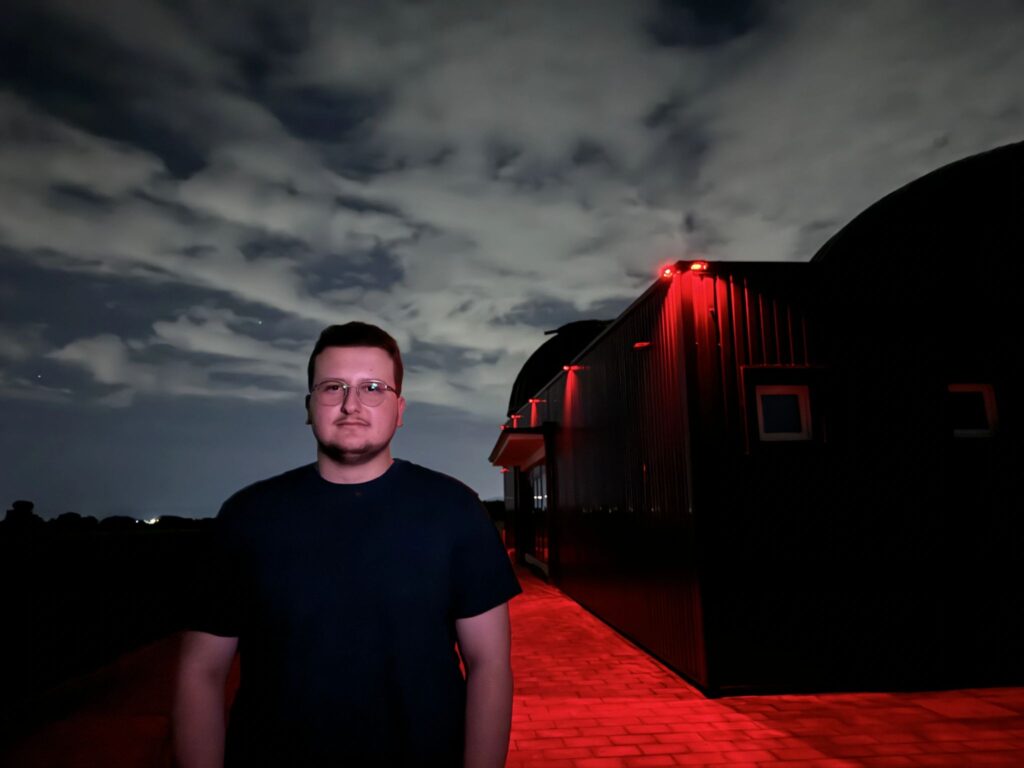By: Allie Woldenberg
At 20 years old, Bujar Mehmeti was one of the youngest people to be accepted into the medical physics program at the University of Wisconsin–Madison.
In 2023 Mehmeti traveled from his home country of Kosovo to begin his PhD in Madison with a concentration in X-ray and CT.
Completing his undergrad in physics at the University of Debrecen, his choice to pursue medical physics was the opportunity to combine his range of interests in physics, math, science and medicine.
His journey began with a spark for astronomy, in 2018 when he became a member of the Astronomy Outreach of Kosovo, the largest group in the country that deals with astronomy advancements and outreach.

As Project Coordinator for 3-4 years, Mehmeti recalls the hard work and dedication that went into the opening of the first National Observatory and Planetarium of Kosovo Observatory this past summer. The Observatory is currently the home of the largest solar telescope in Eastern Europe.
In June, Mehmeti traveled home to Kosovo for the opening ceremony for the Observatory and describes how rewarding it felt to have seen the project grow from his initial meeting as a general member of the group.
“It was special. We had people like the senior vice CEO of Celestron LLC. We had people from the Charlie Bates Solar Astronomy Project, U.S. Army veterans, Apollo mission workers… it went great, because I remember the very first time I joined the group,” Mehmeti said.
With his extreme involvement in the advancement of astronomy efforts in Kosovo, everyone assumed Mehmeti would study astronomy at university, but this was not the case. He chose to graduate from the University of Debrecen with a bachelor’s in physics, a choice he made with the intention of coming back to Madison for his PhD, setting himself on a path he yearned for.
“I always wanted to help people, but I didn’t want to be only on the diagnostic part. I want to help tackle the problem from different angles. I had this feeling that I could do more as a scientist,” Mehmeti said.
Mehmeti talked to a range of professors he knew from his past endeavors, who suggested he should consider pursuing medical physics.
“UW was at the top of my list,” Mehmeti said.
Amidst his application to other institutions, he described a feeling he had during the interview with Professor Guang-Hong Chen that made him sure the Department of Medical Physics and Dr. Chen would help him accomplish his goals.
“I just felt it was the right thing to do, and immediately that day I was more than happy to accept Dr. Chen’s offer,” Mehmeti said.
He recalls the difference in coming to Wisconsin from Kosovo, other than the Midwest humidity. The new equipment and labs gave Mehmeti high hopes for students like him who plan on pursing research and hands-on experiments.
Mehmeti compared the opportunities he found in medical physics to a water fountain.
“The water never stops; it’s an infinite source of knowledge you receive.”